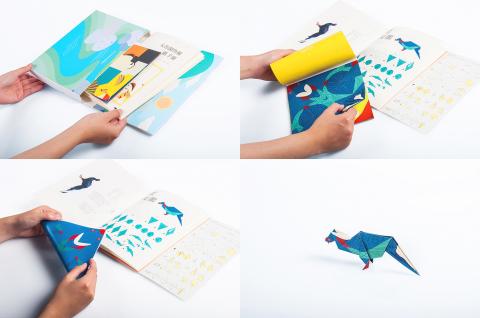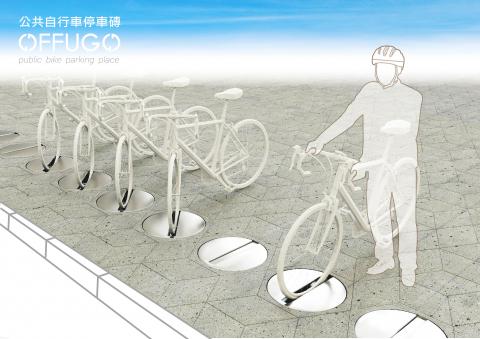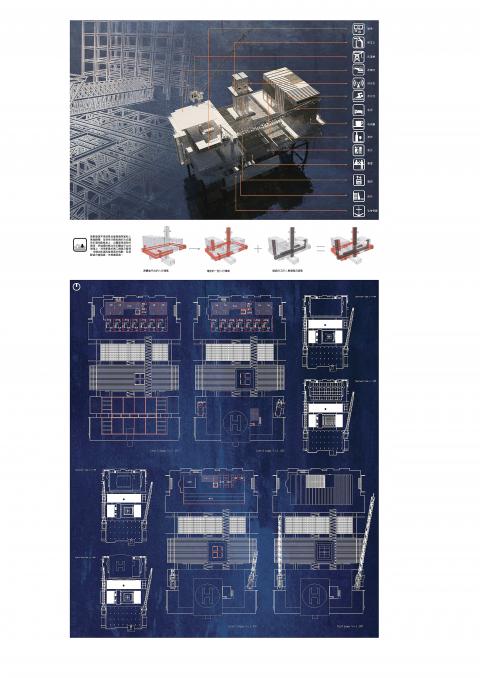Three college seniors have created an innovative bike lock meant to provide more room on Taipei’s congested sidewalks. Offugo (公共自行車停車磚) is an aluminum alloy plate that fits like a manhole cover into the ground and works by pinning a tire to a retractable spine. It doesn’t look like much, but that’s the main attraction.
“Think about YouBike, which uses a special rack on the sidewalk,” said co-inventor Cin Siou-huei (秦秀惠) about Taipei City’s bike rental system. “Take away the bike and that rack is still there, taking up space in a space-poor city.”
“Our lock isn’t a visual or literal block to pedestrians,” she said. “Also, in the end it would be cheaper to switch to this system from the YouBike rack, since all you really need is the disc.”

Photo Courtesy of Shu-te University
Last week, the disc was a big winner at the Young Designers’ Exhibition (YODEX, 新一代設計展) in Taipei, where graduating college seniors from across Taiwan vied for a handful of medals. Offugo beat out 1,160 entries for the gold in Product Design (產品設計類) and a silver in the space solutions category (空間設計類), which received 320 entries.
Chou Jing-heng (周敬恆) took a gold medal in the space solutions category with Boundary into the Plan (邊界突入計畫), a scale model based on an abandoned oil drilling platform in the East China Sea. Chou has done major remodeling, which includes knocking out walls and adding a floor with a gambling casino and resort.
Chou even has a colorful story to go with it. The upstairs entertainment zone is for Chinese tourists and the downstairs chambers are for Taiwanese, who service the resort. The space encourages an economic interaction that could allow Taiwan to “elude domination” by its neighbor across the Strait, according to Chou, 22, who is a passionate observer of current events.

Photo Courtesy of Young Designers’ Exhibition
“Hypothetically, if Taiwan is taken over by China, at least we would still have this place. From here, we can slowly take back the island chains, so long as the Taiwanese spirit is there,” he said.
Meanwhile, two students who took a silver medal in the visual communication design category also had tourists in mind, though they were thinking more in the present.
“In bookstores today you can find good guidebooks on Taiwan, but they introduce sites to visit and places to eat. There aren’t many about daily perplexities that foreigners encounter,” said Hazel Tsao (曹乃云).

Photo Courtesy of Chou Jing-heng
Tsao and schoolmate Chen Hsiao-tzu (陳孝慈) won a silver medal for Taiwanese Manual, three books of advice customized for Japanese, American and Chinese visitors. For example, Japanese tourists are warned that tea sold at convenience stores are usually sweetened — “Teas in Japanese stores are not,” Tsao said, citing her interviews with Japanese subjects — while guests from the US are advised that braziers are not garbage disposals. All the advice is presented together on the page, so that the Japanese reader can see all the questions of Americans and Chinese.
“At first, we thought about separating the manuals by language, but then we thought that if we combined all the information, each nationality can see how other people respond to Taiwan and the manuals can be a point of communion for first-time visitors,” said Tsao.
Other YODEX winners included an origami set by Shu-Te University (樹德科技) — original foldable designs based on Toroko Gorge wildlife — which picked up a silver each from the product and visual communication categories. Some of this origami is quite a challenge and designers said they want to encourage parent-child interaction.
The Missing Piece (缺角的圓), which took a gold medal in the digital multimedia design category (數位多媒體設計), does too. It’s a stop-motion film and each of its 220 seconds uses eight to 24 frames that are photographed one at a time, after tiny adjustments to photographed subjects are made by hand. The star of the show is a miniature doll with movable joints and over a dozen detachable faces that were hand molded, etched and painted. Most of the faces are gloomy.
“She knows her parents won’t be there for her birthday, though she remains hopeful,” said designer Chiu Hung-chieh (邱虹潔). “The film ends with the ring of a door bell, which leaves the issue open-ended. It could be the parents.”
“The film is actually based on my personal experience... My parents watched it and said that I exaggerated, but my sister watched it and cried,” Chiu said. “To an extent, my team members also experienced something similar.”
Stop-motion animation is a visibly unfinished and childlike medium that appeals to adults, her team’s intended audience.
“I think that parents in Taiwan are working hard to earn money to give their children better material circumstances, and they leave their children to nannies. What I’m trying to say to them is that a home needs its people,” she said.

April 14 to April 20 In March 1947, Sising Katadrepan urged the government to drop the “high mountain people” (高山族) designation for Indigenous Taiwanese and refer to them as “Taiwan people” (台灣族). He considered the term derogatory, arguing that it made them sound like animals. The Taiwan Provincial Government agreed to stop using the term, stating that Indigenous Taiwanese suffered all sorts of discrimination and oppression under the Japanese and were forced to live in the mountains as outsiders to society. Now, under the new regime, they would be seen as equals, thus they should be henceforth

With over 100 works on display, this is Louise Bourgeois’ first solo show in Taiwan. Visitors are invited to traverse her world of love and hate, vengeance and acceptance, trauma and reconciliation. Dominating the entrance, the nine-foot-tall Crouching Spider (2003) greets visitors. The creature looms behind the glass facade, symbolic protector and gatekeeper to the intimate journey ahead. Bourgeois, best known for her giant spider sculptures, is one of the most influential artist of the twentieth century. Blending vulnerability and defiance through themes of sexuality, trauma and identity, her work reshaped the landscape of contemporary art with fearless honesty. “People are influenced by

Last week, the the National Immigration Agency (NIA) told the legislature that more than 10,000 naturalized Taiwanese citizens from the People’s Republic of China (PRC) risked having their citizenship revoked if they failed to provide proof that they had renounced their Chinese household registration within the next three months. Renunciation is required under the Act Governing Relations Between the People of the Taiwan Area and the Mainland Area (臺灣地區與大陸地區人民關係條例), as amended in 2004, though it was only a legal requirement after 2000. Prior to that, it had been only an administrative requirement since the Nationality Act (國籍法) was established in

The remains of this Japanese-era trail designed to protect the camphor industry make for a scenic day-hike, a fascinating overnight hike or a challenging multi-day adventure Maolin District (茂林) in Kaohsiung is well known for beautiful roadside scenery, waterfalls, the annual butterfly migration and indigenous culture. A lesser known but worthwhile destination here lies along the very top of the valley: the Liugui Security Path (六龜警備道). This relic of the Japanese era once isolated the Maolin valley from the outside world but now serves to draw tourists in. The path originally ran for about 50km, but not all of this trail is still easily walkable. The nicest section for a simple day hike is the heavily trafficked southern section above Maolin and Wanshan (萬山) villages. Remains of